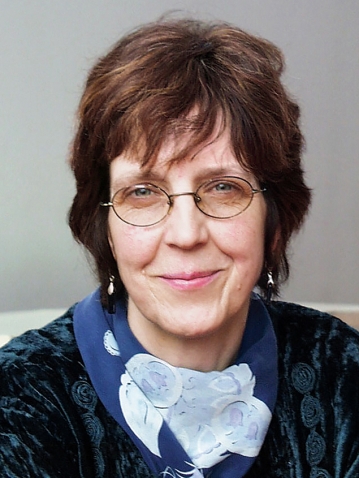Carol Ann Paul, senior instructor of science laboratory emerita and a founding member of the neuroscience program, taught with passion at the College for 27 years (1983 to 2010). She passed away on Oct. 23, 2014. Born in Belfast, Ireland, Carol Ann earned a B.A. in biology and chemistry from Keele University in Staffordshire, England. After graduation, she came to the United States in search of adventure; this spirit was reflected in all aspects of her personal and professional life. She was a devoted mother to her sons, Max and Gavin, and an adoring grandmother to Charlotte (“Charley”). She and her partner of many years, Joseph Rizza, enjoyed frequent winter trips to ski country in New Hampshire. Carol Ann’s love of life was further exemplified by her passion for travel, photography, gourmet cooking, and gardening.
Prior to coming to Wellesley, Carol Ann was a lecturer at Williams College and a lab instructor at Harvard University. While at Wellesley, being the consummate scholar, she obtained a master’s degree in epidemiology from Boston University School of Public Health.
Carol Ann leaves a remarkable legacy in the Science Center, and many of her innovations are still the foundation of the laboratories being taught today in introductory biology, physiology, and neuroscience. She was a gifted experimentalist, designing and implementing a large number of sophisticated laboratories at all levels of the curriculum. She worked effortlessly across disciplines. With a chemistry faculty member, she created a magnetic resonance imaging laboratory, and with a computer-science professor, she developed a laboratory experience where students use a tabletop computer interface to explore bioinformatics.
Carol Ann will be remembered by her students for her commitment to learning and teaching and her dedication to creating meaningful laboratory experiences for them, as well as for her warm smile, high standards, and constant support in and out of the classroom. As an example of Carol Ann’s commitment to our students, when her recent stroke prevented her from formal teaching, she returned to the introductory neuroscience course to tell students about the neuroscience behind strokes and her experiences as a stroke survivor.
Carol Ann’s love of neuroscience could be seen in the breadth of academic endeavors that she pursued. She was the editor of Discovering Neurons: the Experimental Basis of Neuroscience, which was published in 1997 and co-edited by Barb Beltz, the Allene Lummis Russell Professor of Neuroscience, and Joanne Berger-Sweeney ’79, former Wellesley faculty member and associate dean of the College. Carol Ann also disseminated her expertise far and wide by making instructional videos that have received tens of thousands of hits on YouTube. In addition, she authored many peer-reviewed papers, including “Association of Alcohol Consumption with Brain Volume in the Framingham Heart Study” that was published in the Archives of Neurology in 2008 and received national attention. She was the principal investigator on an impressive number of grants, including those from the National Science Foundation for neuroscience curriculum development. She also presented her curriculum ideas at workshops for Project Kaleidoscope and Faculty for Undergraduate Neuroscience, initiatives of the American Association of College and Universities.
Carol Ann came to Wellesley at a time when the laboratory-instructor position of today was in its infancy. For more than 20 years, she worked tirelessly to give the position the professional significance it has now acquired. Among the many issues she advocated for were a much-improved salary scale, the opportunity to live in faculty housing, and the chance to serve on College-wide committees alongside lecturing faculty. Indeed, all science-laboratory instructors owe a huge debt of gratitude to Carol Ann.
Given her many teaching and scholarly contributions to the field, Carol Ann was awarded the Faculty for Undergraduate Neuroscience Lifetime Achievement Award at the Society for Neuroscience meeting this November. Fortunately, her colleagues were able to share this news with her a few weeks before her death, so that she would know how much her contributions to neuroscience were admired and appreciated on a national level. In addition, in recognition of Carol Ann’s profound impact on neuroscience education, the Faculty for Undergraduate Neuroscience has named its annual faculty award in neuroscience education the “Carol Ann Paul Educator of the Year Award.”
We will always be grateful to Carol Ann for her profound contributions to the biology department and neuroscience program and her passion for “learning by doing.” Everyone who knew her, both socially and professionally, will always cherish her friendship, her Irish wit and charm. We will miss her dearly.
—Barbara Beltz (neuroscience), Bevil Conway (neuroscience), Simone Helluy (biological sciences), Margaret Keane (psychology), Janet McDonough (biological sciences), Ginny Quinan (neuroscience), Marc Tetel (neuroscience), Lauri Wardell (physics)





We ask that those who engage in Wellesley magazine's online community act with honesty, integrity, and respect. (Remember the honor code, alums?) We reserve the right to remove comments by impersonators or comments that are not civil and relevant to the subject at hand. By posting here, you are permitting Wellesley magazine to edit and republish your comment in all media. Please remember that all posts are public.